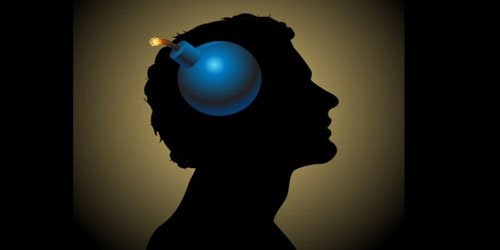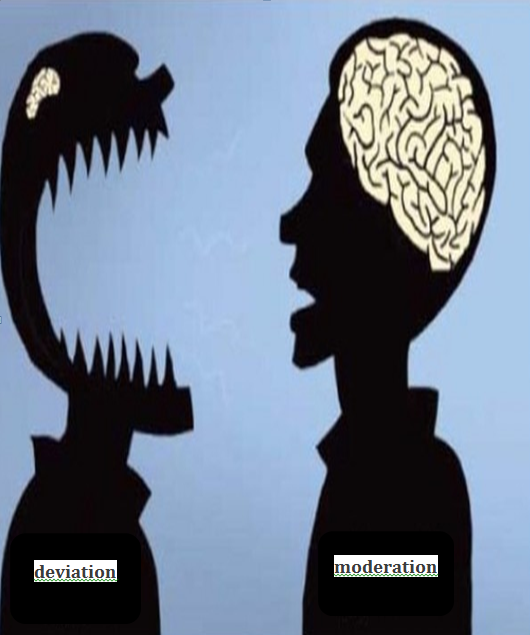
Deviation in sociology is a description of acts or behaviors that breach or violate social norms, including enacted laws, such as criminal activity, or informal breaches, such as the rejection of a society's customs and customs. The deviation is conduct that is incompatible with institutional rules or rules of conduct. The deviation may have a negative connotation, but the violation of social norms is not always negative. the deviation is positive in some cases; Despite breaches of the rules, behavior can be classified as positive or acceptable.
Social norms vary across society and between cultures. A particular act or conduct is perceived as deviant, punishable, or punished in society, and in another society as normal. In addition, the collective perception of deviation changes by changing society's understanding of social norms over time.
A relative deviation relates to where and when it was committed. For example, another person has generally been wrongly killed, except when governments allow it during war or in self-defense situations. There are two main misdeeds, "self-inflicted" and "bad" acts because they have been prevented.
The study of social deviation is of interest to sociologists, psychologists, psychologists, and criminologists, to find solutions to the problems involved, how to find deterrent methods, and the need to find a formula to fit controls over time.
Species
Violation of the rules is classified into two forms of deviation. Formal deviation and informal deviation.
The official deviation is described as a crime that violates the laws of society. The informal deviation is a simple violation of the rules of unwritten social life. Rules of great moral importance are customs. Violation of customs is classified as informal deviations, and custom opposes social taboos.
Social taboos are a strong social form of behavior, considered perverse by the majority. Publicly condemns the talk of prohibitions; So people almost completely avoid it. The prohibited is also called "tabu" from the Tongan word "tapu", which means "under prohibition" or "not permitted." The law prohibits certain forms of social prohibitions, and then a violation of the prohibitions leads to severe penalties. The commission of prohibitions not prohibited by law results in shame, loss of respect, and humiliation. Social taboos are not universal but exist in the majority of societies. Examples include murder, rape, incest, and child harassment.
Select Howard S. Baker, a social theorist of stigma theory, has four different types of deviant behavior:
1: False accusation: Others consider that an individual's behavior complies with the rules of society or is perverse.
2: Pure deviation: Others consider that the individual engages in delinquent and unlawful behavior.
3: Compliance: Others consider that the individual complies with social norms distributed within society.
4: Clandestine deviation: An individual is not regarded as deviant or engaged in any conduct contrary to the rules.
Posts
Deviant acts can be assertions of individuality and identity and are therefore a rebellion against the group's prevailing cultural norms in favor of a subculture. The behavior of an individual or group in a society determines how deviation creates rules.
Emil Durkheim claims that deviation was a natural and necessary part of social organization. Four important delinquency functions were mentioned:
1: "The deviation confirms cultural values and norms. Any definition of virtue is based on the notion of opposition to virtue: there can be no good without evil or justice without crime ".
2: Deviation determines moral boundaries, so people learn right and wrong by appointing perverted persons.
3: Dangerous forms of deviation force people to join hands and interact against them.
4: Deviation pushes the moral boundaries of society, leading to social change.
Theories
There are three broad social layers describing deviant behavior: structural functionality, symbolic interaction, and conflict theory.
Structural functionality
In structural functionality, researchers are interested in how diverse factors in social support interact to shape everyone. Emile Durkheim and Robert Merton's work contributed to the development of functional ideals.
Durkheim's normative theory on suicide
Social deviation from the collective conscience is abused. Durkheim describes the collective conscience as a set of social norms followed by members of society. Without the collective conscience, there is no absolute ethics in institutions and groups.
Social integration is the association with groups and institutions. Social organization is the commitment to society's norms and values. Durkheim's theory attributes social deviation to extremism in social integration and social organization. Durkheim has developed four types of suicide depending on the relationship between social integration and social organization:
1: Altruistic suicide occurs when an individual is overly integrated into society.
2: Selfish suicide occurs when the individual does not integrate socially.
3: Atomic suicide occurs when there is very little social organization as a result of a sense of lack of purpose and despair.
4: Deadly suicide occurs when an individual tests social organization excessively.
Tension Theory
Deviation by viewing goals and means as part of the theory of tension/social decay. Durkheim considers social decay to be a rebuttal of social norms. Some people believe that social degradation is a situation in which society's goals and means of achieving these goals are not compatible. Some people assumed that an individual's response to the expectations of society and the means to achieve those expectations helped to understand the deviation. Collective action was seen as motivated by tension, stress, and frustration in a group of individuals as a result of the disconnect between society's goals and common means of achieving them. Non-routine collective behavior (such as riots, insurgency, etc.) is often said to be due to economic explanations and reasons for tension. These two dimensions determine the extent to which society is adapted by the existence of societal culture goals, which are society's perceptions of exemplary life, and institutional means, which are legitimate means to enable the individual to reach those goals.
Describe five types of deviation in terms of acceptance or rejection of social objectives and institutional means to achieve them:
1: Innovation is a response caused by pressure caused by the focus of social culture on wealth on the one hand and the lack of opportunities for wealth on the other, which makes people "innovative" by engaging in theft and the sale of drugs. Innovators accept society's goals but reject socially acceptable means of achieving the goals. (For example, critical success is achieved by committing a crime). Some people claim that innovators are often those who have lived through the same visions around the world as complaints but have been denied opportunities to legitimately achieve society's goals.
2: The complainants accept the goals of society and the means that society legislates to achieve these goals (e.g.: monetary success is achieved through hard work). Some people claim that complaints are often middle-class people working in middle-class jobs, who have been able to access the opportunities society offers such as quality education, and seek critical success through hard work.
Adherence to rituals refers to the inability to reach the goal set by social culture, thereby adopting rules to the point of omitting important goals in favor of a sense of respect. Ritual adherents reject society's objectives but accept the institutional means of society. Those who adhere to rituals commonly work in blocked and repetitive jobs, they cannot achieve the goals of society while adhering to the means and customs of society.
3: Cessation is the rejection of the goals and means defined by the culture of society, "leaking" the individual and rejecting the goals of society and the legitimate means of achieving them. In Merton's view, these are real perverts, who commit perverse acts to achieve goals that are inconsistent with society's values.
4: The rebellion is somewhat resembling a decline; Because individuals here also reject legitimate goals and means in society, but they take an additional step towards a "counterculture." Supports other existing social systems (breaking rules). Rebels reject society's legitimate goals and means of achieving them and create alternative goals and new means of replacing society's goals. They not only create new goals, but also new ways of achieving these goals that will receive the acceptance of other rebels.

Downvoting a post can decrease pending rewards and make it less visible. Common reasons:
Submit
Misconceptions represent a time bomb
Downvoting a post can decrease pending rewards and make it less visible. Common reasons:
Submit